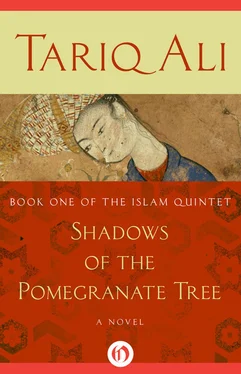Miguel had returned to Qurtuba. Zahra was dead. Zuhayr was in Gharnata. Kulthum was visiting her cousins and future in-laws in Ishbiliya. The family presence in the dining-chamber was unusually depleted. This made the circle of which Ibn Daud was a part more intimate than usual. Zubayda had noticed him gazing into Hind’s eyes with a smile, and this reassured her. Perhaps it had been a false alarm. Perhaps Umar’s instincts had been closer to reality than hers. She began to feel guilty and wanted to tell her husband not to ask the boy any embarrassing questions, but it was too late. Umar had already begun to speak.
‘Ibn Daud,’ said the master of the house, ‘would you care to take a short walk with me after you have finished your coffee?’
‘It would be an honour, sir.’
‘Can I join you too?’ asked Yazid in a matter-of-fact voice, trying to sound as adult as he possibly could. Since Zuhayr was away, he felt he should be present at such an occasion.
‘No,’ smiled Hind. ‘I want a game of chess. I think I am going to take your king in under ten moves.’
Yazid was torn, but his sister prevailed.
‘On reflection,’ he said to his father, ‘I will remain indoors. I think it is getting cold outside.’
‘A sensible decision,’ said Umar as he rose from the floor and walked towards the door leading to the terrace.
Ibn Daud bowed to Zubayda, and looked at Hind as if he was pleading with her not to judge him too harshly. He followed Umar out of the room.
‘Go to my room and lay the chess pieces on the cloth,’ Hind instructed her brother. ‘I will join you in a moment.’
‘I think we were wrong about Ibn Daud,’ said Zubayda the minute her son had left the room. ‘Did you observe him while we were eating? He had eyes only for you. He may be confused, but he is very attached to you.’
‘What you say may be true, but the uncontrollable passion which I felt for him is gone. I still like him. I may even love him in time, but without the intensity I felt before. The afternoon has left me with a dull headache.’
‘Not even our greatest physicians have been able to solve the riddles of the heart, Hind. Give yourself a chance. You are too much like me. Too impatient. Everything at once. I was like that with your father, and his parents mistook my simple desire for greed.’
‘Surely, Mother,’ said Hind in a very soft voice, ‘we do not know how much time there is left for any of us. When you were young the Sultan was in the al-Hamra palace and the world seemed safe. Today our lives are governed by uncertainties. Everyone in the village feels insecure. Even the false magic of dreams can offer consolation no longer. Our dreams have turned sour. Do you remember when Yazid was crying and clinging to Zuhayr, pleading with him not to go to Gharnata?’
‘Could any mother forget that scene?’
‘The sight of Yazid in such distress angered me and I whispered some rudeness in Zuhayr’s ear. Something stupid. Told him he had been selfish from birth. His face paled. He put Yazid down and took me to one side. Then he whispered fiercely in my ear: “There is nothing to be gained by becoming entangled in life and its daily routines. The only freedom left is to choose how we are to die, and you want to take even that away from me.”’
Zubayda hugged Hind and held her close. They did not speak any more. In the silence they could hear the wind outside. Their bodies transmitted signals to each other.
‘Hind! Hind!’ Yazid’s voice brought them back to the world in which they continued to live. ‘I’ve been waiting. Hurry up! I’ve planned my moves.’
The two women smiled. Some things would never change.
Outside in the dark blue night, Umar and Ibn Daud were walking round the walls of the house. They, too, had been discussing the state of their world, though in more philosophical terms. Now that they were beyond the hearing of the nightwatchmen who patrolled the perimeter of the house, Umar decided that no more time should be wasted.
‘I have heard that you went for a walk with Hind after lunch today. She is a very precious treasure. Her mother and I both love her very much. We do not wish to see her hurt or upset.’
‘I was very pleased when you asked me to come and walk with you. I love Hind. I wish to ask your permission to marry her.’
‘Remember one thing, Ibn Daud,’ said Umar in his most avuncular style. ‘Only a blind man dares to shit on the roof and thinks that he cannot be seen!’
Ibn Daud began to tremble. He was not sure how much Umar knew. Perhaps Yazid had told his mother. Perhaps the maidservants had talked. Perhaps…
‘What I mean, my dear friend, is that there is no excuse for somebody to fall into the same hole twice.’
Now he understood.
‘There is nothing I wish to hide from Hind and yourself or from the Lady Zubayda.’ Ibn Daud spoke with a tremor in his voice. ‘There was an incident some years ago. A fellow student. We loved each other. He died over a year ago. I have not been with any other man or woman. My love for Hind is stronger than it was for my friend. I would sooner die than harm her in any way. If, in your wisdom and with your experience, you and the Lady Zubayda feel that I am the wrong person for her, pray tell me so and I will pack my bag and leave your noble house tomorrow. Your judgement will be final.’
The wind had died, leaving behind a clear sky. Ibn Daud’s honesty had dispelled the gloom of the night and Umar’s heart had lightened. Zubayda’s suspicions, even though he would not admit it to her, had discomforted him. There were far too many family stories of women made unhappy by men who lived only for each other, women who lived on withered dreams. Their sole function, as far as their husbands were concerned, was procreation. Umar’s own grand-uncle, Ibn Farid’s younger brother, had flaunted his male lover in this very house, but he, at least, had never bothered to get married.
‘I am greatly impressed by your honesty. What you tell your future wife is between the pair of you.’
‘Then I have your permission?’ began Ibn Daud, but he was immediately interrupted.
‘You have more than my permission. You have my blessing. Hind will carry a handsome dowry.’
‘I assure you that the dowry is of no interest to me.’
‘Have you any wealth of your own?’
‘None whatsoever. Money has never played an important part in my life.’
Umar chuckled as they began to walk back to the house. The only thing to recommend poverty, he felt, was the way it ennobled some people with a dignity which wealth simply could not match.
‘Never mind, Ibn Daud. You shall have the dowry nonetheless. My grandchildren will thank me for my foresight. Tell me, have you decided on where you want to live? Will you go back to al-Qahira?’
‘No. That is the one place where I do not wish to live. I will naturally discuss all this with Lady Hind, but the Maghrebian town which pleases me the most is Fes. It is not unlike Gharnata, but without the presence of Archbishop Cisneros. Moreover Ibn Khaldun, if my grandmother is to be believed, commended it highly and wished to make it his permanent home.’
Whereas a few weeks ago the sight of Hind making eyes at Ibn Daud had only served to kindle Umar’s irritation with the Qahirene, he now began to feel a kind of admiration for this young man. He no longer found him irksome and too clever for his own good, and had begun to share his confidence that he could survive materially simply on the basis of his intellect. As they reached the inner courtyard Umar felt that he was one of the few men with whom Hind could be happy. He embraced Ibn Daud.
‘Peace be upon you and sleep well.’
‘Peace be upon you,’ responded the scholar from al-Qahira, his voice choked with emotions he was trying so hard to conceal.
Читать дальше












